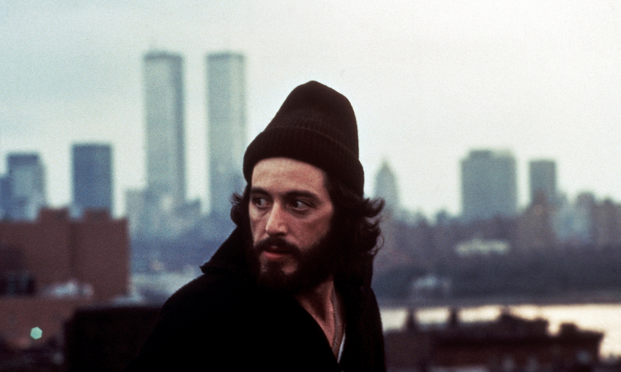When Serpico came out in 1973, the concept of police corruption was still, well, not necessarily new, but extremely accepted and embraced. Frank Serpico (played by Al Pacino) was the first and maybe only police officer with the conviction and unwavering moral compass to alter the direction and practices of the New York Police Department. With a screenplay adapted from a biography by renowned crime writer Peter Maas, Waldo Salt (who was blacklisted during the McCarthy era) and Norman Wexler (writer of the hippie-killing movie Joe) are able to focus succinctly on the twelve-year period of Serpico’s career, which started, bizarrely enough on September 11, 1959. Serpico’s Italian American background is, indeed, part of what propels him to the force. Ironically, Serpico’s parents immigrated from an area of Naples called Marigliano, where the Camorra has a high level of influence over essentially every aspect of life. It is perhaps this element of his personal history that imbued Serpico with such a deep-seated desire for justice and morality.
While at first Serpico is happy to serve as a uniformed policeman, saving women from rape and wrongly accused men of raping them, he quickly starts to see how things really work at the NYPD, brutality among the favorite flavors. Although the first years of his career are marked by concern with severing ties with his old neighborhood in Brooklyn, moving to the much chicer Greenwich Village and a romance with an aspiring theater actress/dancer named Laurie (Barbara Eda-Young), Serpico is constantly plagued by the corruption he sees go on as a plainclothesman. It affects everything he does, from losing his relationship to begging to be transferred to a new precinct, one that promises to be, according to the commissioner, as “clean as a hound’s tooth.”
Believing this is true, Serpico takes the transfer to the Bronx, where he finds it to be even worse than his last precinct in terms of the payoffs that are taken by his fellow officers. With no one to turn to except Bob Blair (Tony Roberts), a cop whose made it up higher on the ladder thanks to his gift for politicking but is still one of the only honest ones among them, Serpico increasingly incriminates himself to the other officers that can smell a rat a mile away.
After numerous attempts to get in contact with the chief of police through Captain Inspector McClain (Biff McGuire), who feigns interest in Serpico’s cause but has really just been brushing him off for the most part, Serpico takes matters into his own hands by first trying to bring the case to Mayor Lindsay’s office, which also ignores his pleas, and then to The New York Times, which finally helps to establish the investigative body that became known as the Knapp Commission.
With every police officer in town aware of Serpico’s traitordom, he is a marked man just waiting to see who will be the one to quite literally stab him in the back. After being transferred back to Brooklyn to the narcotics unit, Serpico is again threatened not to expose the corrupt activities of the other officers, who have a successful drug ring of their own going on worth hundreds of thousands of dollars. Serpico tries his best to go along with their ways without engaging in anything immoral for his own part. His goodness, as usual, backfires tremendously. While on the ride for a drug bust at the now illustrious 778 Driggs Avenue, Serpico’s backup more than likely lures him into the trap of knocking on the door to pretend to be an interested buyer, only to get shot in the face as a result of no one helping him take on the suspect. He was left behind by his partners, who refused to call in a 10-13 indicating a policeman had been shot (though this element is excluded from the film).
Serpico’s survival prompts him to testify yet again for the Knapp Commission, giving the powerful speech,
Through my appearance here today, I hope that police officers in the future will not experience the same frustration and anxiety that I was subjected to for the past five years at the hands of my superiors because of my attempt to report corruption. I was made to feel that I had burdened them with an unwanted task. The problem is that the atmosphere does not yet exist in which an honest police officer can act without fear of ridicule or reprisal from fellow officers. Police corruption cannot exist unless it is at least tolerated at higher levels in the department. Therefore, the most important result that can come from these hearings is a conviction by police officers that the department will change. In order to ensure this… an independent, permanent investigative body dealing with police corruption, like this commission, is essential.
Time and again, Serpico’s actions back then have proven to remain extremely rare and courageous. With police abuse continuing to persist at a rampant level, one wonders what the department would be like had Serpico never stepped forward at all–maybe a vigilante militia capable of doing what it wants right out in the open. Oh right, that is what it is.






















